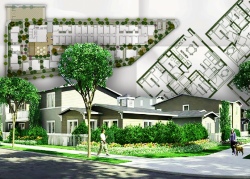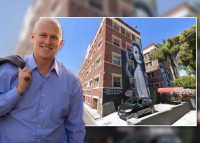The name was intended as an honor, but after searing complaints from a family member, a controversial homeless housing project in Venice will drop its association with a Black pioneer of the oceanfront enclave.
“We did go ahead and remove the Reese name from our project,” said Becky Dennison, the executive director of Venice Community Housing, one of the project’s developers.
The developers “want to be respectful of all family members,” Dennison added, “and that’s what we have done.”
Venice Community Housing does not yet have a new name for the project, Dennison said.
The 106,000-square-foot development proposal, formerly known as the Reese-Davidson Community, has long ranked among Los Angeles’ most contentious homeless housing projects. It’s slated to rise on a nearly three-acre site that’s owned by the City of L.A. and currently used as a beach parking lot.
Plans call for 140 units of affordable and supportive housing as well as a community arts center, small retail, and landscaping. The community was designed by the starchitect firm Eric Owen Moss Architects and seen by supporters as a necessary step to address the housing crisis in the heart of Venice — a neighborhood where homelessness has surged in recent years. In recent months, after simmering tensions over the tent encampments that eventually crowded significant stretches of Venice, the area has also emerged as a focal point in L.A.’s broader, highly contentious homelessness debate.
For years critics have weighed in against the Reese-Davidson project for a number of reasons, including the community’s design, size, and location. They also contend the housing development will offer relatively little social benefit compared to its cost, and inhibit beach access to the general public.
Those complaints have mostly come from Venice homeowners, but late last month Sonya Reese Greenland, the granddaughter of Arthur Reese — the first Black resident of Venice, who went on to help shape the character of the bohemian enclave — also went public with her outrage over the construction.
Reese Greenland is the trustee of the Arthur L. Reese Family Archive, and claimed her grandfather “would be appalled” by the development and its impact on Venice. She demanded the developers remove the association.
In a statement, Venice Community Housing said that ahead of its decision to use the Reese name the developer had coordinated with another Reese family member, Jataun Valentine, who was on Venice Community Housing’s board at the time.
“We were not and are not aware of any naming rights issues for the family, based on Jataun’s direct input and our collective research,” the statement said. “There was strong support for the initial decision.”
The team decided to rename the development “based on Jataun’s guidance following last week’s communications with her family,” the statement continued.
After Reese Greenland’s letter was published Evan Hines, the son of Gregory Hines – a Tony Award-winning choreographer, dancer and actor who lived in Venice and was intended to be the namesake of the project’s community arts center – also demanded the removal of that family name. But the Hines name will remain in place, Dennison said, because the “family has a formal naming rights process, and we have a signed agreement with the legal designee of the family.” The designee, Dennison said, remains “very supportive” of the association with the project.
The developer has already removed the Reese name from its website (the project is currently described as “New Development”) and says it will also begin removing the Reese name from public documents and promotional materials.
The controversy follows recent progress for the development , which advanced in April with a key approval from the city’s planning commission still needs full City Council approvals.
Read more


